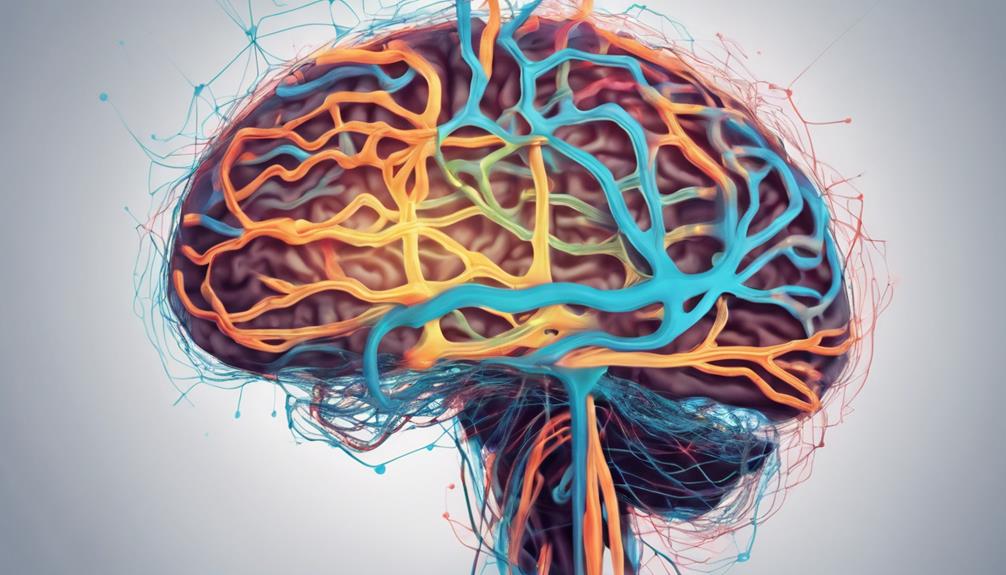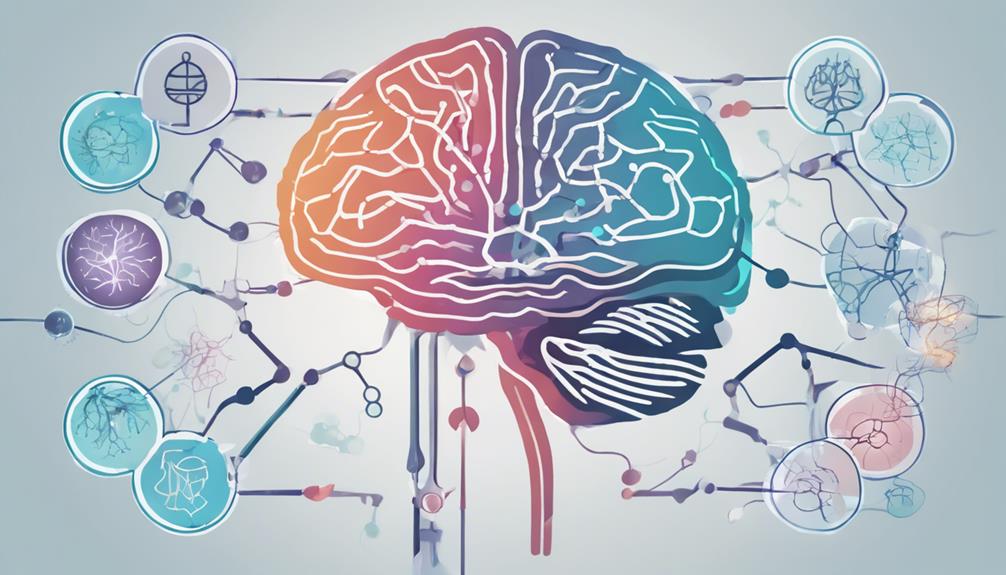Mind-body lifestyle hypnosis techniques offer a comprehensive approach to inner harmony and overall well-being. They focus on the deep connection between mental and physical health, emphasizing practices like mindfulness and self-hypnosis. By reprogramming beliefs and behaviors, hypnosis aids in stress reduction, weight loss, and improved sleep. These techniques foster emotional balance, empowering individuals to break free from negative patterns. Through hypnosis, one can achieve total wellness by enhancing motivation and mental clarity. Embrace these practices for a holistic journey towards inner peace and emotional well-being.
Understanding Mind-Body Connection

How does the mind influence the body through the intricate connection known as the mind-body link? Mental wellness and physical health are closely intertwined, forming a symbiotic relationship that impacts overall well-being.
Research indicates that mental states, such as stress, anxiety, and depression, can manifest physically, leading to conditions like cardiovascular disease, weakened immune response, and gastrointestinal disorders.
Maintaining mental wellness is crucial for supporting optimal physical health. Practices like mindfulness, meditation, and hypnosis can positively influence both mental and physical states. By reducing stress and promoting relaxation, these techniques can help lower blood pressure, improve sleep quality, and boost immune function.
Conversely, physical health also plays a significant role in mental well-being. Regular exercise, proper nutrition, and adequate sleep have been shown to enhance mood, cognitive function, and overall mental wellness.
The mind-body connection underscores the importance of holistic approaches to health and highlights the profound impact that mental wellness can have on physical health and vice versa.
Implementing Self-Hypnosis Practices
Self-hypnosis techniques can be effectively implemented to promote mental wellness and physical health through deliberate self-guided hypnotic states. The benefits of self-hypnosis include stress reduction, improved focus, enhanced self-confidence, and pain management.
To effectively practice self-hypnosis, individuals should start by finding a quiet and comfortable space where they can relax without distractions. Deep breathing and progressive muscle relaxation can help induce a state of relaxation conducive to self-hypnosis. Visualization techniques, such as imagining a peaceful scene or repeating positive affirmations, can deepen the hypnotic state and reinforce desired outcomes.
One effective self-hypnosis technique involves creating personalized hypnotic scripts tailored to individual goals and needs. These scripts can be recorded and played back during self-hypnosis sessions to enhance the hypnotic experience. Additionally, regular practice and consistency are key to maximizing the benefits of self-hypnosis.
Enhancing Lifestyle Choices With Hypnosis

Utilizing hypnosis techniques can be a strategic approach to enhancing lifestyle choices for individuals seeking to make positive behavioral changes. Hypnosis benefits individuals by tapping into their subconscious minds, allowing for the reprogramming of deep-rooted beliefs and behaviors. This reprogramming can lead to significant lifestyle improvements such as smoking cessation, weight loss, stress reduction, and improved sleep patterns.
One of the key hypnosis benefits in enhancing lifestyle choices is its ability to address underlying issues that may be hindering an individual's progress towards healthier habits. By targeting these underlying issues through hypnosis, individuals can experience long-lasting changes in their behaviors and attitudes towards aspects such as exercise, diet, and mental well-being.
Furthermore, hypnosis can empower individuals to break free from negative thought patterns and self-sabotaging behaviors, enabling them to adopt healthier lifestyle choices with greater ease and consistency. Through targeted hypnosis sessions, individuals can cultivate a mindset that supports positive lifestyle improvements, leading to enhanced overall well-being and quality of life.
Cultivating Inner Harmony and Balance
Cultivating inner harmony and balance through hypnosis techniques involves harnessing the power of the subconscious mind to promote emotional equilibrium and mental well-being. Inner peace, a state of tranquility and contentment, is essential for overall wellness. Emotional balance, the ability to manage and respond to emotions in a healthy way, plays a crucial role in achieving inner harmony.
Hypnosis can aid in accessing the subconscious mind, where deep-seated beliefs and emotions reside. By targeting these underlying factors, hypnotherapy can help individuals address internal conflicts, release negative thought patterns, and cultivate a sense of inner peace. Through guided hypnotic sessions, individuals can reframe perspectives, build resilience, and foster emotional balance.
Attaining inner harmony and balance is a multifaceted process that involves self-awareness, introspection, and emotional regulation. Hypnosis serves as a tool to facilitate this journey by tapping into the subconscious mind's potential for transformation. By integrating hypnosis techniques into daily practices, individuals can enhance their emotional well-being and cultivate a lasting sense of inner peace and equilibrium.
Integrating Hypnosis for Total Wellness

Exploring the integration of hypnosis techniques into holistic wellness practices can provide a comprehensive approach to enhancing mental and emotional well-being. Hypnosis for relaxation and stress relief has been increasingly recognized for its potential in promoting total wellness. By leveraging hypnosis as a tool for inducing a state of deep relaxation, individuals can alleviate stress and anxiety, leading to a more balanced mental state.
Furthermore, self-improvement through hypnosis practice offers a unique avenue for individuals to address underlying issues and foster personal growth. Through guided hypnosis sessions, individuals can tap into their subconscious mind to reframe negative thought patterns, boost self-confidence, and enhance motivation. This process of self-improvement through hypnosis can contribute significantly to overall well-being by empowering individuals to make positive changes in their lives.
Incorporating hypnosis into wellness routines not only supports mental and emotional health but also nurtures a holistic approach to total wellness. By embracing the transformative power of hypnosis, individuals can embark on a journey towards achieving harmony and balance in their lives.
Frequently Asked Questions
Can Hypnosis Help With Chronic Pain Management?
Hypnosis has shown promise in managing chronic pain by enhancing pain relief through cognitive restructuring and relaxation techniques. This approach aligns with holistic wellness principles, offering a potential adjunctive therapy for individuals seeking comprehensive pain management strategies.
Is Self-Hypnosis Safe for Everyone?
Self-hypnosis, when practiced correctly, can be safe for most individuals. It's essential to consider one's mental health before attempting self-hypnosis, particularly for anxiety relief. Consulting with a qualified professional can help ensure safety and effectiveness.
Can Hypnosis Improve Athletic Performance?
Hypnosis has shown potential to enhance athletic performance by improving mental focus and physical endurance. Research suggests that hypnosis can help athletes overcome performance barriers, increase confidence, and optimize mindset for peak results in sports.
How Long Does It Take to See Results From Hypnosis?
The effectiveness of hypnosis varies among individuals, impacting the timeframe for results. Factors such as the issue being addressed, the individual's receptiveness, and the skill of the hypnotherapist influence when changes may be noticed.
Can Hypnosis Help With Overcoming Phobias?
Hypnosis has shown promise in fear alleviation and anxiety reduction by targeting subconscious patterns. Studies suggest hypnotherapy can assist in overcoming phobias by addressing underlying triggers and promoting cognitive restructuring for lasting results.
Conclusion
In conclusion, the integration of mind-body lifestyle hypnosis techniques offers a holistic approach to achieving inner harmony and balance.
By understanding the mind-body connection and implementing self-hypnosis practices, individuals can enhance their lifestyle choices and cultivate total wellness.
Through the utilization of hypnosis, individuals can tap into their subconscious mind to promote positive changes and achieve a state of harmony that benefits their overall well-being.











































